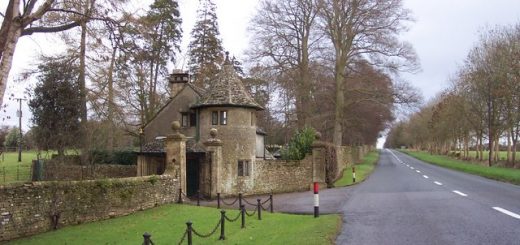Francis Tantum Apparition 1795
The Quaker herbalist, Phebe Howitt nee Tantum, mother of the author William Howitt (18 December 1792 – 3 March 1879) had a strange experience in 1795 when her brother Francis Tantum was killed. The following letter from William Howitt dated 28 March 1859 was written whilst he was living in Highgate and gives a full account of his mothers experience. In 1847 William and his wife had started to move away from their Quaker beliefs and were becoming more involved with Spiritualism, with him becoming a leading Spiritualist journalist during the 1860’s. This letter was published in ‘Footfalls on the Boundary of Another World’ by Robert Dale Owen and again in the later ‘The Haunted Homes and Family Traditions of Great Britain’ by John Ingram (1897).
“The circumstance you desire to obtain from me is one which I have many times heard related by my mother. It was an event familiar to our family and the neighbourhood, and is connected with my earliest memories; having occurred about the time of my birth, at my father’s house at Heanor, Derbyshire, where I was born.
“My mother’s family name, Tantum, is an uncommon one, which I do not recollect to have met with except in a story of Miss Leslie’s. My mother had two brothers, Francis and Richard. The younger, Richard, I knew well, for he lived to an old age. The elder, Francis, was, at the time of the occurrence I am about to report, a gay young man, about twenty, unmarried, handsome, frank, affectionate, and extremely beloved by all classes throughout that part of the country. He is described, in that age of powder and pig-tails, as wearing his auburn hair flowing in ringlets on his shoulders, like another Absolom, and was much admired, as well for his personal grace as for the life and gaiety of his manners.
“One fine calm afternoon my mother, shortly after a confinement, but perfectly convalescent, was lying in bed, enjoying from her window the sense of summer beauty and repose; a bright sky above, and the quiet village before her. In this state she was gladdened by hearing footsteps, which she took to be those of her brother Frank, as he was familiarly called, approaching the chamber door. The visitor knocked and entered. The foot of the bed was towards the door, and the curtains at the foot, notwithstanding the season, were drawn, to prevent any draught. Her brother parted them, and looked in upon her. His gaze was earnest and destitute of its usual cheerfulness, and he spoke not a word. ‘My dear Frank,’ said my mother, ‘how glad I am to see you! Come round to the bedside, I wish to have some talk with you.’
“He closed the curtains, as if complying; but instead of doing so, my mother, to her astonishment, heard him leave the room, close the door behind him, and begin to descend the stairs. Greatly amazed, she hastily rang, and when her maid appeared she bade her call her brother back. The girl replied that she had not seen him enter the house. But my mother insisted, saying, ‘He was here but this instant, run ! Quick ! Call him back ! I must see him!’
“The girl hurried away, but, after a time, returned, saying that she could learn nothing of him anywhere ; nor had anyone in or about the house seen him either enter or depart.
“Now, my father’s house stood at the bottom of the village, and close to the high road, which was quite straight; so that anyone passing along it must have been seen for a much longer period than had elapsed. The girl said she had looked up and down the road, then searched the garden, a large, old-fashioned one, with shady walks; but neither in the garden nor on the road was he to be seen. She had inquired at the nearest cottages in the village, but no one had noticed him pass.
“My mother, though a very pious woman, was far from superstitious; yet the strangeness of this circumstance struck her forcibly. While she lay pondering upon it, there was heard a sudden running and excited talking in the village street. My mother listened, it increased, though up to that time the village had been profoundly still ; and she became convinced that something very unusual had occurred. Again she rang the bell, to inquire the cause of the disturbance. This time it was the monthly nurse who answered it. She sought to tranquillize my mother, as a nurse usually does a patient. ‘Oh, it is nothing particular, ma’am,’ she said, ‘some trifling affair,’ which she pretended to relate, passing lightly over the particulars. But her ill-suppressed agitation did not escape my mother’s eye. ‘Tell me the truth,’ she said, ‘at once. I am certain something very sad has happened.’ The woman still equivocated, greatly fearing the effect upon my mother in her then situation; and at first the family joined in the attempt at concealment. Finally, however, my mother’s alarm and earnest entreaties drew from them the terrible truth that her brother had just been stabbed at the top of the village and killed on the spot.
“The melancholy event had thus occurred. My uncle, Francis Tantum, had been dining at Shipley Hall with Mr. Edward Miller Mundy, Member of Parliament for the county. Shipley Hall lay off to the left of the village as you looked up the main street from my father’s house, and about a mile distant from it; while Heanor Fall, my uncle’s residence, was situated to the right; the road from the one country seat to the other crossing nearly at right angles the upper portion of the village street, at a point where stood one of the two village inns, the ‘Admiral Rodney,’ respectably kept by the widow H ks. I remember her well a tall, fine-looking woman, who must have been handsome in her youth, and who retained, even past middle age, an air superior to her condition. She had one only child, a son, then scarcely twenty. He was a good-looking, brisk, young fellow, and bore a very fair character. He must, however, as the event showed, have been of a very hasty temper.
“Francis Tantum, riding home from Shipley Hall after the early country dinner of that day, somewhat elated, it may be, with wine, stopped at the widow’s inn, and bade the son bring him a glass of ale. As the latter turned to obey, my uncle, giving the youth a smart switch across the back with his riding-whip, cried out, in his lively joking way, ‘Now, be quick, Dick; be quick!’
“The young man, instead of receiving the playful stroke as a jest, took it as an insult. He rushed into the house, snatched up a carving-knife, and darting back into the street, stabbed my uncle to the heart as he sat on his horse, so that he fell dead, on the instant, in the road.
“The sensation throughout the quiet village may be imagined. The inhabitants, who idolised the murdered man, were prevented from taking summary vengeance on the homicide only by the constables carrying him off to the office of the nearest magistrate.
“Young H ks was tried at the next Derby Assizes; but (justly, no doubt, taking into view the sudden irritation caused by the blow) he was convicted of manslaughter only; and, after a few months imprisonment, returned to the village; where, notwithstanding the strong popular feeling against him, he continued to keep the inn, even after his mother’s death. He is still present to my recollection, a quiet, retiring man, never guilty of any other irregularity of conduct, and seeming to bear about with him the constant memory of his rash deed a silent blight upon his life.
“So great was the respect entertained for my uncle, and such the deep impression of his tragic end, that so long as that generation lived the church bells of the village were regularly tolled on the anniversary of his death.
“On comparing the circumstances and the exact time at which each occurred, the fact was substantiated that the apparition presented itself to my mother almost instantly after her brother had received the fatal stroke.




Re: Francis Tantum Apparition 1795
William Howitt and his wife were friends of Dante Gabriel Rossetti an on 28 March 1854 their daughter Anna Mary Howitt managed to persuade Elizabeth Siddal to seek medical advice from Dr James John Garth Wilkinson.
‘… With difficulty they at last succeeded in persuading the obstinate girl to visit Dr. Garth Wilkinson,…It was, in fact, Anna Mary and her friends Bessie Parkes and Barbara Leigh Smith who had pushed the lovers into active pursuit of remedies…’(Oswald Doughty, A Victorian romantic: Dante Gabriel Rossetti, (Oxford University Press, 1960).